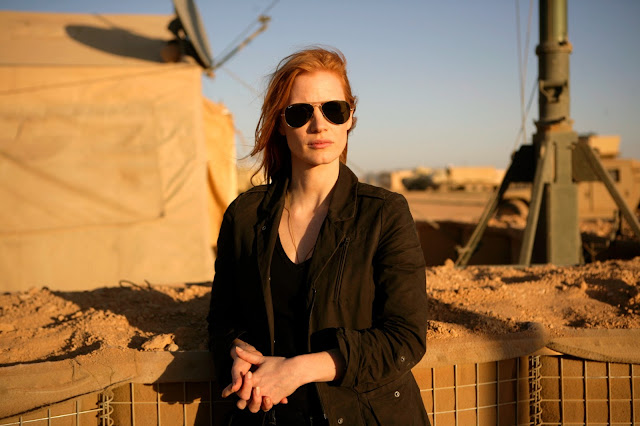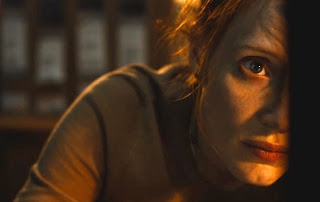Zero Dark
Thirty is the next movie on our list. I absolutely loved this one, though I
have to admit that it really challenged my views on the role of the CIA, the
way in which we gather intelligence, and the meaning of safety. Plus, Jessica
Chastain is crazy awesome as Maya, the obsessive CIA agent who hunts down Bin
Laden, and Kathryn Bigelow was pretty epically robbed for that Directing
Nomination.
But first, introductions. Zero Dark Thirty is a heavily researched,
as-accurate-as-they-could-make-it portrayal of the hunt for Osama Bin Laden in
the years after the 9/11 attacks. So obviously it’s just full of warm fuzzy
moments and feel good musical numbers.
It chiefly follows Maya, played by Jessica Chastain, a
rookie CIA agent who comes to Pakistan in the early 2000s for the express
purpose of helping to track down Bin Laden. While she does work on other
assignments throughout her time in Pakistan, which goes up through about 2009,
I think, her goal, manic and devoted, is finding UBL (as he is referred to by
the agency).
I suppose the cool thing about the movie is that Maya is
based on a real person, not a series of composites, but really based on the one
person in the CIA who was able to put together a web of information about UBL’s
whereabouts and eventually convinced the White House to sanction the raid that
killed him. Which is good, I guess?
As a hardcore pacifist (yes, pacifists can be hardcore),
this movie was pretty challenging for me. On a visceral level, I want the good
guys to win and the bad guys to lose. I want her to find UBL, because she’s a
good(-ish) person and UBL is bad and this will keep people safe. On the other
hand, I believe firmly that violence begets violence, and that it is never okay
to raise a hand against another person. Soooo…issues.
Particularly hard for me to swallow were the (accurate) depictions
of the way in which intelligence was actually gathered. By which I mean, the
scenes where Chastain, a lovely, sweet looking woman, was coldly torturing
detainees. And the later scenes where the CIA agents sat around and complained
about the sanctions Obama had placed on torture? Pretty chilling.
But even if I don’t agree with its politics, or even the
opinions of most of the characters, I still loved this movie. And I think a lot
of that can be attributed to the way
it told the story.
For starters, telling a story about a ten year-long manhunt
can easily be the most boring thing ever. Most intelligence gathering is the
analysis of newspapers, videotapes, transcripts of conversations with
prisoners, photographs, records, trying to put together some level of
comprehensive data collection. It’s a lot of computer time, and I don’t know if
you’ve noticed, but computers are not inherently cinematic.
There’s a reason why shows like CSI and Bones, and movies
like Hackers and Swordfish, see the need to either radically enhance our computing
ability, or else distract you from how boring typing is by adding blowjobs.
Much to its credit, Zero Dark Thirty does
neither. The scenes of research are compelling not because of shaky camera
action or a melodramatic voiceover, but because we are emotionally involved in
Maya’s search, and we freaking care. We care a lot.
I also have to give a lot of credit to Bigelow here, because
the filming of this movie is one of her great masterpieces. While lesser
directors (*cough* Tom Hooper *cough*) would feel the need to incessantly move
the camera around, creating a false tension and a great deal of seasickness,
Bigelow trusts in her story and actors, and actually leaves the camera static
for long stretches of time.
Instead of becoming boring, though, it forces the
audience to obsess over every nuance of expression in the actors’ eyes. In a
way, this form of filming makes us hyper-attentive to detail, just like Maya
is.
And I like that.
The real triumph of the movie, however, goes to Chastain,
whose performance as Maya is pretty much everything I want a “strong female
character” to be. She’s physically capable, but able to retreat when attacked.
She won’t take no for an answer, unless you have a good reason for saying it.
She’s confident in her beliefs, brash in the face of opposition, and positively
riddled with faults. She is willing to ask for help. She is not perfect. She’s
human, but cool. Which is all we can ask for, really.
The moment that clinched my love for this character was the
very end. I mean, spoiler alert, Bin Laden dies, but the actual moving bit was
after that. Maya boards a transport plane, and the pilot asks where she wants
to go. And she just starts to cry.
As a director, there is a very easy urge to give into that
would have you make the end of the movie epic and exciting and lots of
difficult camera shots. But how much more moving to have a static camera shot
in the middle distance, of a single character, and the emotions playing across
her face.
Chastain is positively brilliant in that moment, as a woman
who has suddenly realized that she’s won, but she’s also lost her reason for
living, and I have to say, please give this woman awards. Give her lots of
awards. If it were possible to give Jennifer Lawrence awards too, that would
make me happy, but if pressed, I’m gonna pick Chastain. She killed it here, she
really did.
And by it, I mean Bin Laden.
 |
| Redhead in Pakistan = maybe a little too memorable. |




Aragon: War is upon you whether you would risk it or not.
ReplyDelete^ that quote from LOTR is how I usually lead when describing my stance on hawks v. doves (pacifists). I literally cannot hurt even a fly or spider (and I have arachnophobia!) but if someone was trying to rape me or I saw someone being randomly attacked I would fight, protect myself and others. And that's how I see war. Peace only works if both sides will it and if you refuse to fight when someone is trying to kill you, your chances of dying go drastically up. War is often about self-defense and the defense of others. I'm not saying it doesn't get out of control, it definitely goes to a dark and ugly place, but I think there's a difference between doing something violent to stop more violence and just people being violent. Often it's about neutralizing unprovoked attacks. For instance, sending a SWAT team in to take out a mass murderer. If someone is a mass murderer (like on a shooting spree on a school campus) they probably can't be convinced with words to stop because if they listened to reason and compassion they wouldn't be in that situation.